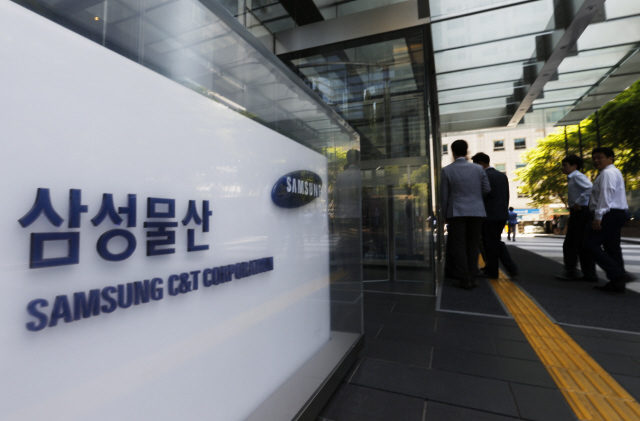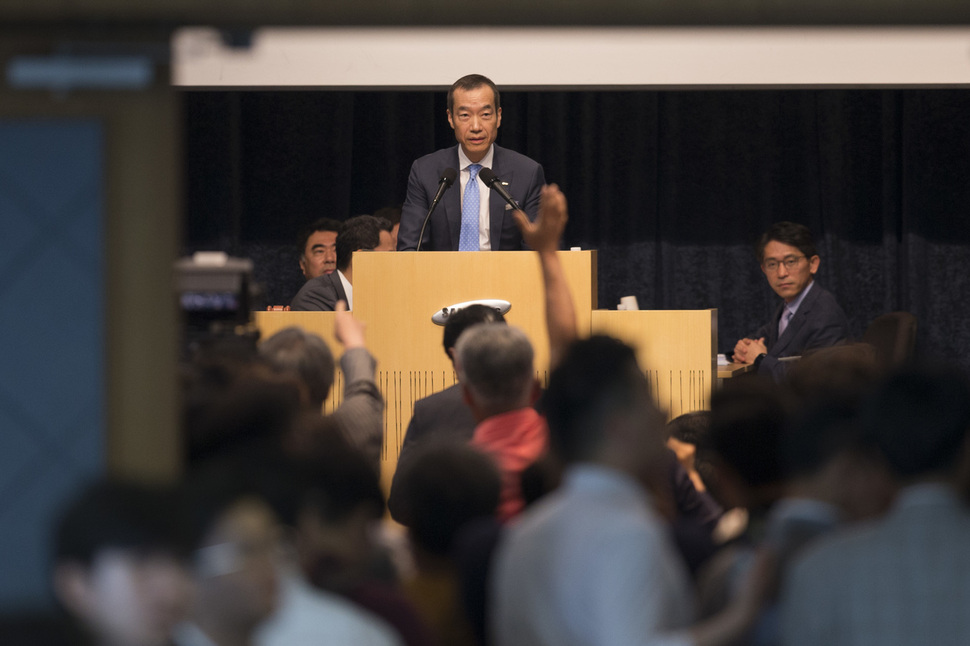Posted on : May.23,2019 15:57 KST
Modified on : Jul.11,2019 17:49 KST
 |
|
Samsung C&T Corporation (Hankyoreh archives)
|
Accounting firms that drafted merger report effectively pressured to inflate numbers
Samsung inflated the corporate value of Cheil Industries by around 3 trillion won (US$2.52 billion) ahead of a 2015 merger with Samsung C&T by presenting it as being involved in a “new bio project using Everland flora and fauna,” it has been learned. In terms of appraised value, the amount was larger than the 1.8 trillion won (US$1.51 billion) in unabsorbed call option liabilities at Samsung BioLogics (Samsung Bio), which is currently under investigation by prosecutors. The two cases alone had Cheil Industries’ value overestimated by some 4.8 trillion won (US$4.02 billion). The merger was structured in such a way that the Samsung Electronics chairman’s control increased with Cheil Industries’ estimated value.
The Hankyoreh recently acquired a “Samsung C&T and Cheil Industries merger ratio examination report” drafted in May 2015 by Deloitte Anjin and Samjong KMPG, two of South Korea’s four major accounting corporations. The report calculated a suitable merger ratio with the two corporations respectively taking the sides of Samsung C&T and Cheil Industries in estimating their corporate value. In particular, the Anjin report on behalf of Samsung C&T served as a major basis in enlisting support for the merger from the National Pension Service and Samsung C&T shareholders. Because it was classified as confidential, the details have never been released to the public.
 |
|
Choi Chi-hun, Chief Executive Officer and President of Samsung C&T Engineering & Construction Group, presides over a general shareholders meeting regarding the Samsung C&T-Cheil merger in Seoul on July 7, 2015. (Kim Seong-gwang, staff photographer)
|
An examination of the report on May 22 showed Anjin estimating Cheil Industries’ total value at 21.3 trillion won (US$17.89 billion), with the “biotech division” (Cheil Industries Bio) assigned a going value of 2.9 trillion won (US$2.43 billion; 3 trillion won according to Samjong). The report presumed an increase in sales from 83.9 billion won (US$70.34 million) for the project’s inaugural year of 2016 to 4 trillion won (US$3.35 billion) by 2024. The Cheil Industries Bio project is completely separate from Samsung Bio. In the report, the description “biotech division (new plant project)” appears without any explanation.
Eventually, it came to light that this “business” only existed on paper, as a plan to “use plants and animals owned by Everland for biomaterials and health care.” Nevertheless, the nonexistent business was valued higher than Cheil Industries’ main businesses of construction (1.5 trillion won, or US$1.26 billion), fashion (1.3 trillion won, or US$1.09 billion), and food and beverages (2.5 trillion won, US$2.1 billion). No traces of the Cheil Industries biotech business can be found anywhere in the business plans or other documents made public by Cheil Industries prior to the merger or by Samsung C&T since then. Both at the time of the merger and today, it’s a “phantom business” without any actual substance.
When the Hankyoreh asked Samsung C&T whether the business in question had been pursued or whether there were any plans to do so, Samsung C&T said it was not appropriate to respond given the ongoing investigation.
An accountant who reviewed the report said it was “so shoddy that it’s hard to believe it was prepared by a major accounting firm” and reported “clear signs of being thrown together haphazardly.”
Anjin admitted it was “unable to guarantee report’s accuracy, reliability, or impartiality
Accounting experts believe that the report by Deloitte Anjin and Samjong was likely carefully tailored according to Samsung’s demands. In the report itself, Anjin includes the following caveat: “Our calculations were entirely based on a general business plan provided by the company in question [Cheil Industries] and by material drafted outside of the company. We were unable to acquire or review detailed materials or to carry out any interviews.” Anjin also said it was “unable to guarantee this report’s accuracy, reliability, or impartiality.”
While this appears to be an attempt to avoid liability for any potential problems, it also serves as an admission that the firm did a sloppy job and was under Samsung’s thumb. A figure who has handled an investigation into Samsung said, “The only possible conclusion is that Samsung staff compelled Anjin accountants to inflate the value of Cheil Industries.”
Even so, this dubious report was treated as a highly credible document during the merger proceedings. It bolstered the case that Samsung C&T made to stockholders in June that approving the merger was the right choice. Samsung C&T explained that it had reached this conclusion after a meticulous assessment, including “a due diligence into accounting and tax matters by Anjin.”
The report also influenced the decision by South Korea’s national pension fund — which cast the deciding vote in the merger motion as the largest stockholder in Samsung C&T — to support the merger. After receiving this report from Samsung in mid-June 2015, the pension fund’s operational body passed it along to the investment committee, which made the final decision about the merger.
“We presumed that the report was credible since it was prepared by an accounting firm,” said an employee at the pension fund who was in charge of the technical matters.
If not for the report’s statement of the inflated assessment of Cheil Industries, the company’s own estimate of the merger rate probably wouldn’t have been enough to convince the pension fund to support the merger.
“Making use of a report by an accounting firm that cannot guarantee its impartiality or reliability is tantamount to deceiving stockholders,” said Hong Sun-tak, an accountant and a member of the executive committee of the economic and financial center at People’s Solidarity for Participatory Democracy.
The prosecutors who are currently investigating the charges of fraudulent accounting at Samsung Biologics also reportedly believe that the value of Cheil Industries was artificially inflated through the Cheil Industries biotech business and are looking into whether this action would constitute breach of duty that harmed the interests of stockholders at Samsung C&T.
By Bae Ji-hyun, staff reporter
Please direct comments or questions to [english@hani.co.kr]










